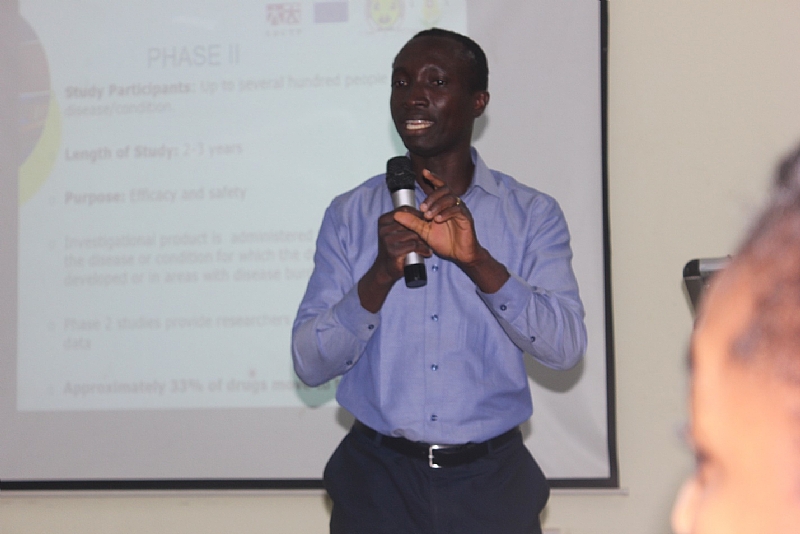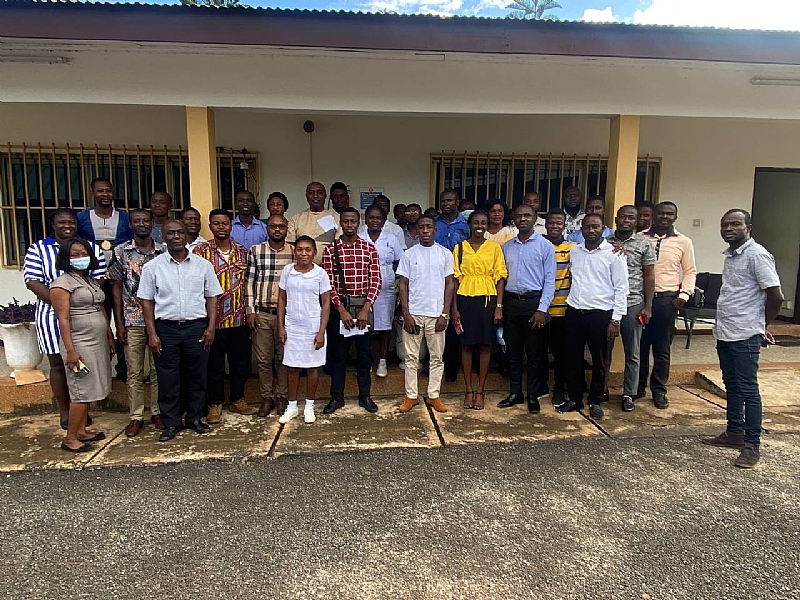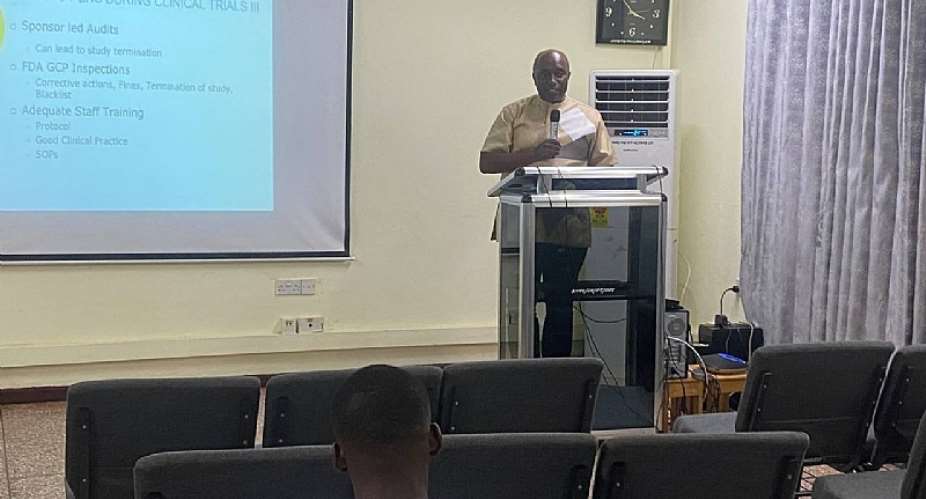The Kintampo Health Research Centre (KHRC), with support from the European & Developing Countries Clinical Trials Partnership (EDCTP) is organizing a series of workshops to sensitize health professionals in the Bono East region about clinical trials.
Two sessions of the workshop have been held at KHRC. The first and second sessions were held on September 6, 2022, and September 13, 2022, respectively.
The workshop is aimed at broadening the knowledge and understanding of health professionals, who are seen as key stakeholders, about the role of clinical trials in evidence-based medicine discovery and to help them appreciate the ethical and regulatory standards applied in the implementation of clinical trials in Ghana.
Addressing the participants, Dr. Kwaku Poku Asante, Director of the Kintampo Health Research Centre stressed the importance of clinical trials to health professionals as it is a means through which humanity can be saved.
He added that “as health professionals, we forget that clinical trials are as important as the medications that we give to our patients. The reason is that without clinical trials, we don’t get medications and vaccines on the market. The other reason is that clinical trials have been done elsewhere but recently, a lot of trials are being done on the continent and the reason is that we have strong health systems and the capacity, to support the conduct clinical trials”.
He urged health professionals to be ambassadors of clinical trials and educate people who are oblivious of the benefit of clinical trials and how they are conducted.
Dr. Fred Adomako Boateng, Regional Director of Health Services, delivering his presentation on disease burden in low-and middle-income countries (LMICs) during the first session, explained that these countries “bear the highest burden of disease globally as a direct consequence of scarce resources in health care”.
The double burden of disease in developing countries according to him, emphasizes the strong need to conduct clinical research to identify cost-effective and novel treatments in these countries.

Mr. Japhet Anim, clinical research fellow
Mr. Japhet Anim, clinical research fellow and lead organizer of the workshop, noted that most research is conducted in high-income countries, where a conducive environment, infrastructure and capacity have been built up in past decades to address the health priorities of these countries. He emphasized the need to promote and advance good quality clinical research in Africa in order to maintain gains made in reducing disease burden and close the significant remaining gap.
Dr. Prince Agyapong, a clinical research fellow at KHRC disclosed that prior to the start of a clinical trial, preclinical trials are conducted to generate preliminary information on the efficacy, toxicity and safety of a vaccine or drug. Additionally, wide doses of the drugs are tested using in vitro (test tube or cell culture) and in vivo (animal) experiments before they are introduced into the human body.
Highlighting some major challenges that impede the conduct of clinical trials in the country, Dr. Samuel Ekow Harrison, clinical research fellow at the centre noted that myths and fake news surrounding blood draws often threaten the recruitment of participants. He again mentioned low community and stakeholder support as a key challenge in the conduct of clinical trials in Ghana.

Participants expressed their profound gratitude to the centre for the insightful presentations made by the facilitators.
Topics treated included research ethics, regulatory and ethical oversight, phases of clinical trials, among others. Facilitators at the workshop also included Mr. Elvis Adeniji – Data Manager, KHRC; Mr. Elvis Wilson-Pharmacist, KHRC and Mr. Fred Kanyoke, administrator of the institutional ethics committee.
Established in 1994, the Kintampo Health Research Centre seeks to conduct public health and biomedical research that will influence policy direction and programme implementation that seek to significantly improve well-being and reduce ill-health.
The centre has been in active clinical research for the past 25 years and has been instrumental in performing some key trials that has led to the shift in policy in Ghana and internationally. One such trial was the pivotal phase 3 trial for the WHO-approved RTS, S malaria vaccine.
Source: Kintampo Health Research Centre





 Lay KPMG audit report on SML-GRA contract before Parliament – Isaac Adongo tells...
Lay KPMG audit report on SML-GRA contract before Parliament – Isaac Adongo tells...
 Supervisor remanded for stabbing businessman with broken bottle and screwdriver
Supervisor remanded for stabbing businessman with broken bottle and screwdriver
 NDC watching EC and NPP closely on Returning Officer recruitment — Omane Boamah
NDC watching EC and NPP closely on Returning Officer recruitment — Omane Boamah
 Your decision to contest for president again is pathetic – Annoh-Dompreh blasts ...
Your decision to contest for president again is pathetic – Annoh-Dompreh blasts ...
 Election 2024: Security agencies ready to keep peace and secure the country — IG...
Election 2024: Security agencies ready to keep peace and secure the country — IG...
 People no longer place value in public basic schools; new uniforms, painting wil...
People no longer place value in public basic schools; new uniforms, painting wil...
 'Comedian' Paul Adom Otchere needs help – Sulemana Braimah
'Comedian' Paul Adom Otchere needs help – Sulemana Braimah
 Ejisu by-election: Only 33% of voters can be swayed by inducement — Global InfoA...
Ejisu by-election: Only 33% of voters can be swayed by inducement — Global InfoA...
 Minority will expose the beneficial owners of SML, recover funds paid to company...
Minority will expose the beneficial owners of SML, recover funds paid to company...
 Prof. Opoku-Agyemang has ‘decapitated’ the NPP’s strategies; don’t take them ser...
Prof. Opoku-Agyemang has ‘decapitated’ the NPP’s strategies; don’t take them ser...
